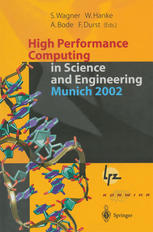

Most ebook files are in PDF format, so you can easily read them using various software such as Foxit Reader or directly on the Google Chrome browser.
Some ebook files are released by publishers in other formats such as .awz, .mobi, .epub, .fb2, etc. You may need to install specific software to read these formats on mobile/PC, such as Calibre.
Please read the tutorial at this link: https://ebookbell.com/faq
We offer FREE conversion to the popular formats you request; however, this may take some time. Therefore, right after payment, please email us, and we will try to provide the service as quickly as possible.
For some exceptional file formats or broken links (if any), please refrain from opening any disputes. Instead, email us first, and we will try to assist within a maximum of 6 hours.
EbookBell Team

4.3
38 reviewsHigh-Performance Computers (HPC) have initiated a revolutionary develop ment in research and technology since many complex and challenging prob lems in this area can only be solved by HPC and a network in modeling, algo rithms and software. In 1998 the Deutsche Forschungsgemeinschaft (German Research Association) recommended to install an additional Federal High Performance Computer followed by the one in Stuttgart. In January 1999 the Wissenschaftsrat (German Science Council) decided that the Leibniz Rechenzentrum (Computing Center) of the Bavarian Academy of Sciences in Munich should run the second Federal High-Performance Computer in Ger many. The investment cost of this Hochstleistungsrechner in Bayern (HLRB) was borne by the Federal Government of Germany and the Free State of Bavaria whereas the operating cost was at the expense of the Bavarian Gov ernment only. The operation of the HLRB is organized in combination with the - Leibniz-Rechenzentrum (LRZ) of the Bavarian Academy of Sciences as the operating authority of the HLRB - Steering Committee of the HLRB - Competence Network for Technical/Scientific High-Performance Comp- ing in Bavaria (KONWIHR). In 2000 a Hitachi SR8000-Fl was installed. It was the first Teraflops Com puter in Germany and reached a peak performance of two Teraflops after an extension at the end of 2001. The goal of HLRB is to provide computer facil ities necessary to solve challenging scientific and technological problems that cannot be solved on big servers but require large (storage) high-performance (very fast) computers and efficient software.